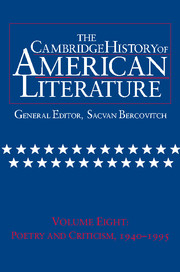Book contents
- Frontmatter
- Introduction
- Poetry, Politics, and Intellectuals
- Criticism since 1940
- Introduction
- 1 Politics and American Criticism
- 2 The Emergence of Academic Criticism
- 3 The Nationalizing of the New Criticism
- 4 The Canon, the Academy, and Gender
- 5 Deconstruction and Poststructuralism
- 6 From Textuality to Materiality
- 7 Cultural and Historical Studies
- Conclusion: Academic Criticism and its Discontents
- Appendix II: Biographies of Critics
- Chronology 1940–1995
- Bibliography
- Index
4 - The Canon, the Academy, and Gender
from Criticism since 1940
Published online by Cambridge University Press: 28 March 2008
- Frontmatter
- Introduction
- Poetry, Politics, and Intellectuals
- Criticism since 1940
- Introduction
- 1 Politics and American Criticism
- 2 The Emergence of Academic Criticism
- 3 The Nationalizing of the New Criticism
- 4 The Canon, the Academy, and Gender
- 5 Deconstruction and Poststructuralism
- 6 From Textuality to Materiality
- 7 Cultural and Historical Studies
- Conclusion: Academic Criticism and its Discontents
- Appendix II: Biographies of Critics
- Chronology 1940–1995
- Bibliography
- Index
Summary
Our account of the emergence of academic criticism in the 1940s and 1950s has emphasized the effort of the new academic critics to establish literary criticism as a discrete, systematic, even “scientific” discipline within the increasingly rationalized disciplinary structure of the postwar university. As we showed, the New Critics and myth critics, and the theorists of American literature who derived from them, all assumed the burden of this legitimating task. All argued for the autonomy, the structural literariness, of the literary works they valued. This argument entailed Cleanth Brooks’ distinction between the fallen worlds of politics or morality and the redeemed world of art, and Northrop Frye’s between “the world {man} sees and the world he constructs, the world he lives in and the world he wants to live in,” the mere brute “environment” and the meanings by which we humanize it. To differentiate art, imagination, and desire from “the environment” was to enhance the special authority of the professional critic.
The feminist critics who in the late 1960s struggled to enter and to change the established field of literary studies also sought authority in the academy and in the larger society, as the new academic critics had done a generation earlier. But, the sources, means, terms, and goals of the quest for authority on the part of feminist critics differed sharply from those of their male predecessors. Most centrally, authority for these women was not a matter of asserting the autonomy of the individual artist or hero against an allegedly routinized mass culture; nor was it a matter of sustaining a place for the humanistic intellectual in a positivistic and materialistic society.
- Type
- Chapter
- Information
- The Cambridge History of American Literature , pp. 324 - 353Publisher: Cambridge University PressPrint publication year: 1996

